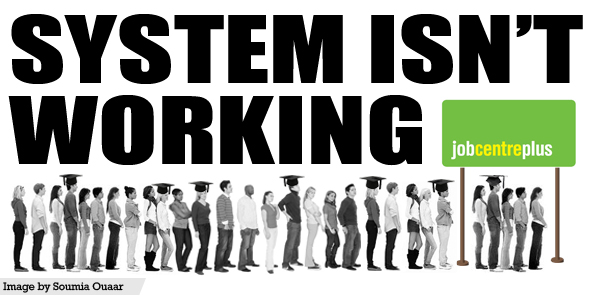System isn’t working: The problems of youth unemployment
It’s no secret that young people are suffering from unemployment. According to recent research by the Prince’s Trust, almost a million young people across the UK are struggling to find a job while 40% of jobless young people have faced symptoms of mental illness as a result of being out of work.
Despite the UK supposedly having overcome recession, young people are still left jobless, and a high number of those unemployed are being diagnosed with depression, panic attacks or anxiety.
Society expects us to have figured out exactly what we want to do and how to go about our lives independently as soon as we hit the big 18. However, at school young people are only being tested on their academic abilities and may not be taught fundamental life skills that can help us with being independent in the future and pursuing a career.
Schools may argue that it’s not their responsibility to teach young people anything other than the national curriculum, but young people spend most of their time at school rather than at home. Parents may be too busy working and supporting their families so they mainly focus on their children’s education and may not have time to teach them real life skills.
A report by Ofsted last year pointed out that careers guidance in schools is not working well enough. Three quarters of the schools visited by Ofsted were not implementing their duty to provide careers advice to students effectively. From my personal experience, I have been to a careers advisor and, instead of them easing my confusion about what course and career I wanted to pursue, they made me even more uncertain about my choices.
This shows that educating young people with real life skills must be implemented.
“At the end of a three-year degree, including living expenses, students on average are left with a £53,000 debt on their shoulders”
One reason schools may be reluctant to offer the independent advice we need is that they have a vested interest in hanging on to their pupils. Schools receive thousands of pounds per pupil from the government. They clearly wouldn’t want to lose this funding by encouraging us to leave school for job opportunities or pursuing potential apprenticeships.
Although tackling youth unemployment will take time, the government could initially start by judging schools and most colleges based not only on academic results but also on how well they teach young people about real life skills. The future depends on how well we can be responsible and independent so that we can be good in the workplace.
Another factor affecting young people is the exceptionally high university fees. Pre-2012, the average university fee was capped at £3,290 a year. Post-2012, students are paying from £6,000 up to £9,000 a year. This means that at the end of a three-year degree, including living expenses, students on average are left with a £53,000 debt on their shoulders.
This dramatic increase in tuition fees can discourage young people to pursue this route because we fear being driven into massive debt while possibly still being unemployed afterwards.
Young people should be encouraged not only to go for a university opportunity but also to think about taking the work route through apprenticeships. An apprenticeship is a real job with training so you can earn a small salary whilst you learn and pick up a nationally recognised qualification as you go. It can take between one to four years and it covers a wide range of careers, from engineering to finance to even digital media.
Having discussed apprenticeships with my friends, a lot of them do not know what they are and what they offer, and this is because the opportunities are not being publicised or spoken about enough.
Young people want work and we want opportunities but we also need someone to help us with the preliminary steps towards independency and responsibility, as well as self-confidence and doing something that will help us with our future.
Although we’re legally independent by 18, undoubtedly many of us are not practically independent at all.





